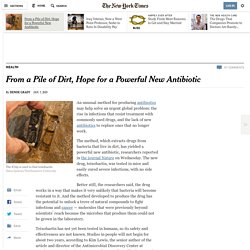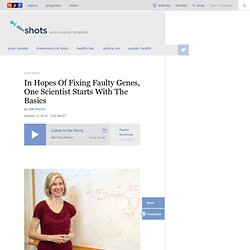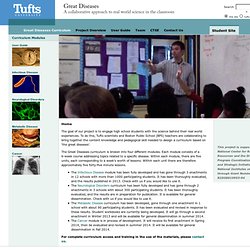

The Making of the Fittest: Got Lactase? The Co-evolution of Genes and Culture. What is CRISPR? New Antibiotic Stirs Hope Against Resistant Bacteria. Photo An unusual method for producing antibiotics may help solve an urgent global problem: the rise in infections that resist treatment with commonly used drugs, and the lack of new to replace ones that no longer work.

The method, which extracts drugs from bacteria that live in dirt, has yielded a powerful new antibiotic, researchers reported in the journal Nature on Wednesday. The new drug, teixobactin, was tested in mice and easily cured severe infections, with no side effects. Better still, the researchers said, the drug works in a way that makes it very unlikely that bacteria will become resistant to it. And the method developed to produce the drug has the potential to unlock a trove of natural compounds to fight infections and cancer — molecules that were previously beyond scientists’ reach because the microbes that produce them could not be grown in the laboratory. Teixobactin has not yet been tested in humans, so its safety and effectiveness are not known. Dr. Dr. Dr. Dr. Dr. In Hopes Of Fixing Faulty Genes, One Scientist Starts With The Basics. Jennifer Doudna and her colleagues found an enzyme in bacteria that makes it much easier to edit DNA in animal cells.

Cailey Cotner/UC Berkeley hide caption itoggle caption Cailey Cotner/UC Berkeley Jennifer Doudna and her colleagues found an enzyme in bacteria that makes it much easier to edit DNA in animal cells. Cailey Cotner/UC Berkeley Whether they admit it or not, many (if not most) scientists secretly hope to get a call in October informing them they've won a Nobel Prize. But I've talked to a lot of Nobel laureates, and they are unanimous on one point: None of them pursued a research topic with the intention of winning the prize. That's certainly true for Jennifer Doudna. The idea came when she and her colleagues at the University of California, Berkeley, were in essence trying to figure out how bacteria fight the flu.
It turns out bacteria don't like getting the flu any more than the rest of us do. As Doudna was studying a group of these enzymes, she realized something. Hunting the Nightmare Bacteria. New Report Details the Economic Costs of Superbug Threat December 10, 2014, 7:55 pm ET · by Tim Molloy Drug-resistant infections could cost 10 million deaths annually and up to $100 trillion by 2050, an economist projects.

Superbugs Killing Thousands of Newborns in India December 4, 2014, 3:28 pm ET · by Tim Molloy A new study says 58,000 Indian infants died last year from antibiotic-resistant bacteria. White House Releases Plan to Fight Antibiotic Resistance September 19, 2014, 11:55 am ET · by David Hoffman and Emma Schwartz Last year, the CDC estimated that 23,000 people die annually in the U.S. and more than 2 million are sickened by resistant infections. WHO: Drug-Resistant Bugs Have Spread to “Alarming Levels” May 1, 2014, 10:40 am ET · by Sarah Childress A drug-resistant world “is instead a very real possibility for the 21st century,” according to a new report.
The Daily Show - vaccinations and science deniers. Great Diseases - Tufts University. The goal of our project is to engage high school students with the science behind their real world experiences.

To do this, Tufts scientists and Boston Public School (BPS) teachers are collaborating to bring together the content knowledge and pedagogical skill needed to design a curriculum based on ‘the great diseases’. The Great Diseases curriculum is broken into four different modules. Each module consists of a 6-week course addressing topics related to a specific disease. Within each module, there are five units, each corresponding to a week’s worth of lessons. Within each unit there are therefore approximately five forty-five minute lessons.
The Infectious Disease module has been fully developed and has gone through 3 enactments in 12 schools with more than 1000 participating students. For complete curriculum access and training in the use of the materials, please contact us. An Outbreak of Liberal Idiocy.